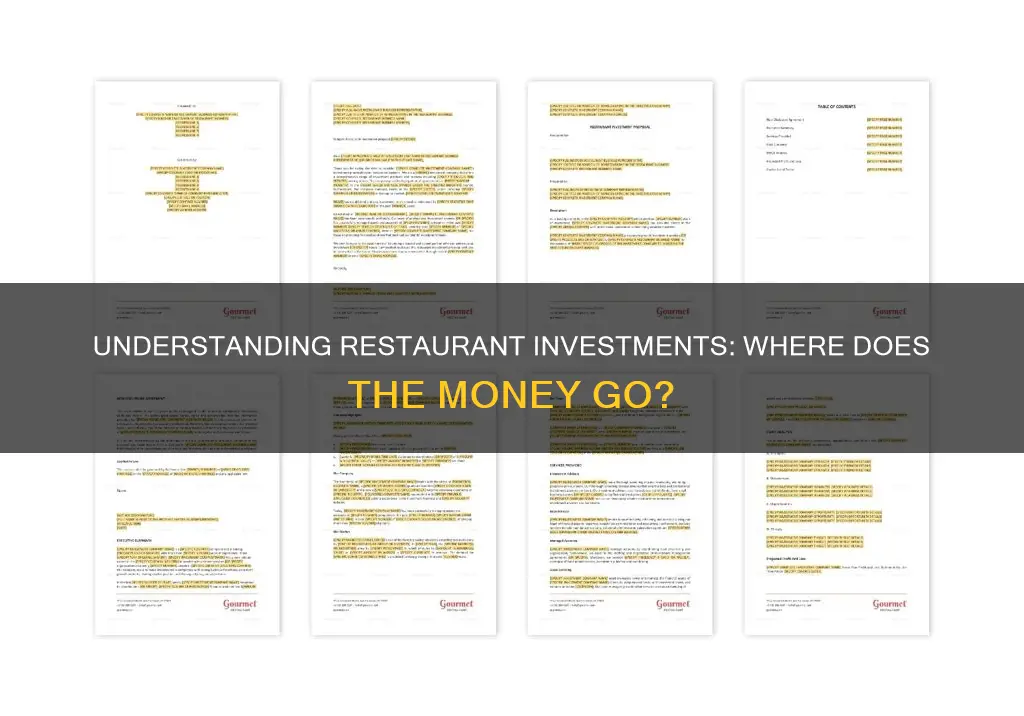
Opening a restaurant is an expensive endeavour, and many restaurateurs seek funding from investors to bring in more capital and mitigate risk. There are several types of investors, including friends and family, angel investors, and venture capital firms. Each investor will have different goals and expectations, and it's important to understand the terms and conditions of any investment agreement before making a decision. When pitching to investors, it's crucial to have a well-thought-out business plan and be able to demonstrate the restaurant's uniqueness and potential for success.
What You'll Learn
- Capital Injection: Investors can provide capital for initial setup, renovations, equipment, and ongoing costs
- Business Growth: Investors can enable expansion, menu development, and marketing
- Expertise and Experience: Investors may offer industry knowledge, marketing strategies, and culinary insights
- Networking Opportunities: Investors can facilitate connections with suppliers, distributors, and other professionals
- Risk Sharing: Investors absorb some financial risk and losses

Capital Injection: Investors can provide capital for initial setup, renovations, equipment, and ongoing costs
Capital Injection: The Role of Investors in Restaurant Funding
The restaurant industry is notoriously challenging, with slim profit margins and high startup costs. As such, many restaurateurs turn to investors to provide the necessary capital injection for their ventures. This capital injection serves several purposes and can be crucial in getting a restaurant off the ground, as well as ensuring its long-term survival.
Initial Setup Costs
One of the most significant expenses in opening a restaurant is the initial setup. This includes the cost of leasing or purchasing a suitable property, as well as any renovations or construction needed to transform the space into a functional restaurant. Investors can provide the funds required to secure a desirable location and create an appealing and functional space for diners.
Equipment Procurement
Equipping a restaurant kitchen is another substantial expense. From industrial-grade ovens and stoves to refrigeration units and dishwashers, the cost of equipment can quickly add up. Investors can help restaurateurs acquire the necessary equipment to run their kitchens efficiently and effectively.
Ongoing Operational Costs
Even after the initial setup, restaurants have ongoing operational costs that can be significant. These include staffing costs, ingredient and supply costs, marketing expenses, and maintenance. Investors can provide the working capital needed to cover these ongoing expenses, ensuring the restaurant can continue operating while building a customer base.
Renovations and Expansion
As a restaurant establishes itself, it may need to renovate or expand to accommodate a growing customer base or changing trends. Investors can provide the funds required for these renovations, helping the restaurant stay competitive and meet the demands of its patrons. Additionally, if a restaurant is successful and seeks to expand to multiple locations, investors can provide the capital needed for this growth.
In conclusion, investors play a crucial role in the restaurant industry by providing capital injections that facilitate initial setup, equipment procurement, ongoing operations, and future expansion. By partnering with investors, restaurateurs can reduce their financial burden and increase their chances of long-term success in this challenging industry.
Cash Investments: What Are They?
You may want to see also

Business Growth: Investors can enable expansion, menu development, and marketing
Investment in a restaurant can be used for business growth, enabling expansion, menu development, and marketing. Investors can provide the capital needed to open additional locations, expand the menu, or invest in marketing and advertising campaigns. This injection of capital can help the restaurant to grow and reach new customers, increasing its customer base and potential for success.
For example, if a restaurant owner wants to open a new location, they will need to secure funding for the new space, equipment, and staffing. An investor can provide the financial resources to make this expansion possible. Similarly, if a restaurant owner wants to develop a new menu, investors can provide the capital needed to hire chefs, purchase ingredients, and market the new menu to customers.
Investors can also help with marketing and advertising campaigns. This may include funding for market research, branding, and promotional activities. By investing in marketing, restaurants can increase their brand awareness, reach new customers, and drive more sales.
In addition to financial resources, investors can also offer expertise and industry connections. They may have experience in restaurant operations, marketing, or culinary trends that can enhance the performance of the business. Investors often have extensive networks within the restaurant industry, which can facilitate valuable connections with suppliers, distributors, and other professionals. These connections can lead to cost savings and additional growth opportunities.
Overall, investors play a crucial role in enabling business growth, expansion, menu development, and marketing for restaurants. Their financial contributions, industry knowledge, and networking opportunities can help restaurants to succeed and thrive in a competitive market.
Projecting Future Cash Flows: A Guide to Investment Projections
You may want to see also

Expertise and Experience: Investors may offer industry knowledge, marketing strategies, and culinary insights
Investors play a crucial role in helping restaurants succeed, and their expertise and experience can be invaluable assets. They bring industry knowledge, marketing strategies, and culinary insights that can make a significant difference in the highly competitive restaurant business.
Industry knowledge is essential for investors to understand the complex dynamics of the restaurant industry. They are well-versed in the latest trends, consumer behaviour, and market demands, which helps them make informed decisions about the business plan, location, and financial projections. This knowledge also enables them to provide strategic guidance on scaling the restaurant, optimizing operations, and enhancing the customer experience.
Marketing is a critical aspect of a restaurant's success, and investors can contribute significantly to developing effective marketing strategies. They can assist in creating a strong brand identity, designing targeted marketing campaigns, and utilizing various marketing channels such as social media, online advertising, and influencer partnerships. Investors also bring valuable insights into leveraging technology, such as customer data platforms and marketing automation tools, to maximize the impact of marketing efforts and increase customer engagement.
Additionally, investors with a culinary background or passion for food can offer valuable insights into menu development, culinary trends, and customer preferences. They can collaborate with chefs to create unique and appealing dishes, ensuring that the restaurant's food offering is not only delicious but also aligns with current trends and customer expectations.
The expertise and experience that investors bring to the table can be a significant advantage for restaurants. Their industry knowledge helps navigate the competitive landscape, while their marketing strategies ensure that the restaurant reaches the right audience and stands out from the competition. The culinary insights they provide can elevate the dining experience, creating a unique and memorable offering that keeps customers coming back for more.
By leveraging the expertise and experience of investors, restaurants can enhance their operations, improve their brand visibility, and ultimately, increase their chances of long-term success in a challenging industry.
Understanding Investment Sensitivity to Cash Flow Changes
You may want to see also

Networking Opportunities: Investors can facilitate connections with suppliers, distributors, and other professionals
Investors can be a valuable source of networking opportunities for restaurateurs. They often have extensive networks within the restaurant industry and can facilitate introductions to potential partners, customers, and other investors. Leveraging these connections can lead to cost savings and growth prospects. Here are some ways investors can help in this regard:
Supplier and Distributor Connections
Investors with experience in the restaurant industry often have established relationships with suppliers and distributors. They can leverage these connections to get you favourable deals on supplies, ingredients, and equipment. This can result in cost savings and efficient procurement processes.
Industry Expertise and Insights
Investors who are industry experts can provide valuable insights and guidance. They understand the challenges and opportunities within the industry and can share best practices. Their expertise can help you navigate common pitfalls and make more informed decisions. Their insights can be especially valuable when it comes to understanding market trends, consumer behaviour, and industry standards.
Access to Potential Partners and Customers
Investors may also have connections with potential business partners who can help you grow your restaurant. They might introduce you to other restaurateurs, chefs, or industry professionals who can become collaborators or mentors. Additionally, investors may have networks of potential customers, which can be beneficial for marketing and promotional activities.
Access to Other Investors
Some investors have connections with other investors or investment groups. They may be able to introduce you to potential sources of funding or individuals who can provide additional support. This can be especially useful if you are seeking multiple investors or looking to expand your investment network.
Long-term Business Relationships
Investors who are satisfied with your restaurant's performance and management are likely to remain connected and supportive in the long term. They may continue to provide guidance, mentorship, and connections even after their initial investment. This long-term support can be invaluable as your restaurant grows and faces new challenges.
Due Diligence and Research
When seeking investors, it is essential to conduct thorough due diligence. Research potential investors' backgrounds, their investment histories, and their connections within the industry. Look for investors who have a strong reputation and a proven track record of success. Attend industry events, conferences, and networking opportunities to meet potential investors and gather information.
Understanding the Cash Flows Statement: Investing Activities
You may want to see also

Risk Sharing: Investors absorb some financial risk and losses
The restaurant business is notoriously risky, with slim profit margins and high failure rates. Investors can play a crucial role in risk management by absorbing some of the financial risks and losses associated with the venture. This risk-sharing arrangement is particularly advantageous for the owner, as it reduces their personal financial exposure.
When a restaurant encounters financial challenges or unexpected setbacks, investors may shoulder a portion of the losses. This not only lessens the burden on the owner but also demonstrates the investors' commitment to the success of the business. It is important to understand that the level of risk an investor is willing to take on may vary. Angel investors, for instance, typically seek a return of 20%-25% on their investment, while venture capitalists often aim for a higher return of around 40%.
The risk-sharing aspect of having investors on board can provide a much-needed safety net for the restaurant. It allows the business to navigate through difficult times, such as unexpected expenses, cash flow issues, or economic downturns. With investors absorbing some of the financial risks, the restaurant has a better chance of weathering the storm and achieving long-term stability.
Additionally, investors often bring valuable industry expertise and connections to the table. They can provide guidance and insights based on their experience, helping the restaurant make more informed decisions and improve its chances of success. Their networks and connections can also facilitate introductions to industry experts, partners, and business opportunities that may otherwise have been inaccessible.
However, it is essential to remember that bringing on investors usually involves giving up partial ownership and sharing decision-making power. The level of control and autonomy the owner retains depends on the investment structure and the terms agreed upon with the investors. It is crucial to carefully consider the potential trade-offs between risk reduction and maintaining control of the business.
In conclusion, investors play a vital role in risk management for restaurants. By absorbing some financial risks and losses, investors provide stability and increase the likelihood of long-term success. Their industry knowledge and connections can also enhance the restaurant's performance and growth prospects. However, owners must be prepared to share decision-making authority and profits with their investors.
Cash Cows: Risky Business and Why You Should Avoid
You may want to see also
Frequently asked questions
There are three main types of investors: friends and family, angel investors, and venture capital firms. Angel investors are wealthy individuals who have expertise in the industry and can offer guidance, while venture capital firms invest in startups and small businesses with high profit potential.
There are pros and cons to bringing on investors. On the one hand, investors can provide capital, mitigate risk, and offer industry expertise and connections. On the other hand, you will need to give up some control and ownership, and may face challenges finding trustworthy investors.
Investors want to see a clear outline of four main areas: vision, management, store economics, and social impact. They want to understand your unique concept, long-term goals, management capabilities, and potential for social impact.







